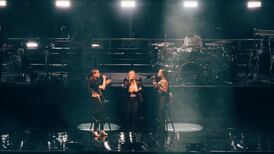Lady Gaga says she was so profoundly affected, and inspired by Harley Quinn, whom she plays in Todd Phillips’s film Joker: Folie à Deux, that she decided to make a companion album reflecting her fictional character’s complexities – and to release it on her own terms.
“Particularly as a woman in music and a female producer, it was really fun to go, ‘This album will be – and I will be – what I want, when I decide, whenever I feel like it,’” she told Zane Lowe on Apple Music 1. “‘If I want it to be blues it’ll be blues. If I want it to be funk it’ll be funk. If I want it to be soul it’ll be soul.’” Or, she didn’t add, old-school cabaret jazz.
Gaga has form in this area, notably through her two collaborative albums with Tony Bennett – Cheek to Cheek, from 2014, and Love for Sale, from 2021 – and through her recent Jazz & Piano Las Vegas residency. So she’s no ingenue when it comes to tackling material imbued with the sophisticated jazz sensibilities of Bennett, Frank Sinatra, Judy Garland or Harry Connick jnr, or the performative panache of Liza Minnelli.
There are well-worn classics here, including Get Happy, That’s Entertainment, That’s Life and If My Friends Could See Me Now, that in other or hands would prompt sighs of boredom. What makes Harlequin stand out are stylistic treatments that fuse the razzle-dazzle of show tunes with the unsettling unpredictability of Harley Quinn.
‘I found out the rugby player I’m seeing is four-timing me, and I am more attracted to him than ever’
‘I couldn’t sit through it’: New Oscars rule requires members to watch all films before voting
At home with Brendan Courtney by the sea in Wicklow: ‘I wanted to simplify my life’
Wealth gap tensions: ‘My friends don’t have to budget like me. A round of cocktails scares the s**t out of me’
You can hear it in the unexpected bent-over guitar notes in Get Happy, in the uberseductive groove of the 1932 song I’ve Got the World on a String and in a barnstorming blues-guitar version of the spiritual hymn When the Saints Go Marching In. And it’s there in force (in fact, tour de force) in If My Friends Could See Me Now.
Quieter moments arrive with Charlie Chaplin’s Smile (equally a vocal masterclass and a nod to the 2019 film Joker, which references Chaplin’s Modern Times) and a lightheaded, guileless version of Bacharach and David’s Close to You.
Two originals complete the theme: the mid-tempo waltz of Folie à Deux could be straight out of a Busby Berkeley joint, while Happy Mistake begins with much fragility (“I can try to hide behind the make-up, but the show must go on ... My head is filled with broken mirrors, so many I can’t look away“) before ending with a sense of escalating fragmentation. It’s a classic Gaga track that once again acutely references her film character.
A new album of original material arrives in February. In the meantime, this will do very nicely.












